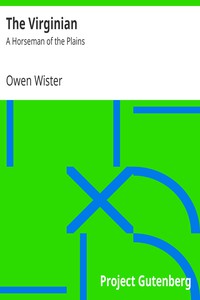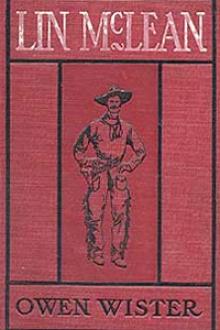The Virginian: A Horseman of the Plains, Owen Wister [best e books to read txt] 📗

- Author: Owen Wister
Book online «The Virginian: A Horseman of the Plains, Owen Wister [best e books to read txt] 📗». Author Owen Wister
II. “WHEN YOU CALL ME THAT, SMILE!”
We cannot see ourselves as others see us, or I should know what appearance I cut at hearing this from the tall man. I said nothing, feeling uncertain.
“I reckon I am looking for you, seh,” he repeated politely.
“I am looking for Judge Henry,” I now replied.
He walked toward me, and I saw that in inches he was not a giant. He was not more than six feet. It was Uncle Hughey that had made him seem to tower. But in his eye, in his face, in his step, in the whole man, there dominated a something potent to be felt, I should think, by man or woman.
“The Judge sent me afteh you, seh,” he now explained, in his civil Southern voice; and he handed me a letter from my host. Had I not witnessed his facetious performances with Uncle Hughey, I should have judged him wholly ungifted with such powers. There was nothing external about him but what seemed the signs of a nature as grave as you could meet. But I had witnessed; and therefore supposing that I knew him in spite of his appearance, that I was, so to speak, in his secret and could give him a sort of wink, I adopted at once a method of easiness. It was so pleasant to be easy with a large stranger, who instead of shooting at your heels had very civilly handed you a letter.
“You're from old Virginia, I take it?” I began.
He answered slowly, “Then you have taken it correct, seh.”
A slight chill passed over my easiness, but I went cheerily on with a further inquiry. “Find many oddities out here like Uncle Hughey?”
“Yes, seh, there is a right smart of oddities around. They come in on every train.”
At this point I dropped my method of easiness.
“I wish that trunks came on the train,” said I. And I told him my predicament.
It was not to be expected that he would be greatly moved at my loss; but he took it with no comment whatever. “We'll wait in town for it,” said he, always perfectly civil.
Now, what I had seen of “town” was, to my newly arrived eyes, altogether horrible. If I could possibly sleep at the Judge's ranch, I preferred to do so.
“Is it too far to drive there to-night?” I inquired.
He looked at me in a puzzled manner.
“For this valise,” I explained, “contains all that I immediately need; in fact, I could do without my trunk for a day or two, if it is not convenient to send. So if we could arrive there not too late by starting at once—” I paused.
“It's two hundred and sixty-three miles,” said the Virginian.
To my loud ejaculation he made no answer, but surveyed me a moment longer, and then said, “Supper will be about ready now.” He took my valise, and I followed his steps toward the eating-house in silence. I was dazed.
As we went, I read my host's letter—a brief hospitable message. He was very sorry not to meet me himself. He had been getting ready to drive over, when the surveyor appeared and detained him. Therefore in his stead he was sending a trustworthy man to town, who would look after me and drive me over. They were looking forward to my visit with much pleasure. This was all.
Yes, I was dazed. How did they count distance in this country? You spoke in a neighborly fashion about driving over to town, and it meant—I did not know yet how many days. And what would be meant by the term “dropping in,” I wondered. And how many miles would be considered really far? I abstained from further questioning the “trustworthy man.” My questions had not fared excessively well. He did not propose making me dance, to be sure: that would scarcely be trustworthy. But neither did he propose to have me familiar with him. Why was this? What had I done to elicit that veiled and skilful sarcasm about oddities coming in on every train? Having been sent to look after me, he would do so, would even carry my valise; but I could not be jocular with him. This handsome, ungrammatical son of the soil had set between us the bar of his cold and perfect civility. No polished person could have done it better. What was the matter? I looked at him, and suddenly it came to me. If he had tried familiarity with me the first two minutes of our acquaintance, I should have resented it; by what right, then, had I tried it with him? It smacked of patronizing: on this occasion he had come off the better gentleman of the two. Here in flesh and blood was a truth which I had long believed in words, but never met before. The creature we call a GENTLEMAN lies deep in the hearts of thousands that are born without chance to master the outward graces of the type.
Between the station and the eating-house I did a deal of straight thinking. But my thoughts were destined presently to be drowned in amazement at the rare personage into whose society fate had thrown me.
Town, as they called it, pleased me the less, the longer I saw it. But until our language stretches itself and takes in a new word of closer fit, town will have to do for the name of such a place as was Medicine Bow. I have seen and slept in many like it since. Scattered wide, they littered the frontier from the Columbia to the Rio Grande, from the Missouri to the Sierras. They lay stark, dotted over a planet of treeless dust, like soiled packs of cards. Each was similar to the next, as one old five-spot of clubs resembles another. Houses, empty bottles, and garbage, they were forever of the same shapeless pattern. More forlorn they were than stale bones. They seemed to have been strewn there by the wind and to be waiting till the wind should come again and blow them away. Yet serene above their foulness swam a pure and quiet light, such as the East never sees; they might be bathing in the air of creation's first morning. Beneath sun and stars their days and nights were immaculate and wonderful.
Medicine Bow was my first, and I took its dimensions, twenty-nine buildings in all,—one coal shute, one water tank, the station, one store, two eating-houses, one billiard hall, two tool-houses, one feed stable, and twelve others that for one reason and another I shall not name. Yet this wretched husk of squalor spent thought upon appearances; many houses in it wore a false front to seem as if they were two stories high. There they stood, rearing their pitiful masquerade amid a fringe of old tin cans, while at their very doors began a world of crystal light, a land without end, a space across which Noah and Adam might come straight from Genesis. Into that space went wandering a road, over a hill and down out of sight, and up again smaller in the distance, and down once more, and up once more, straining the eyes, and so away.
Then I heard a fellow greet my Virginian. He came rollicking out of a door, and made a pass with his hand at the





Comments (0)